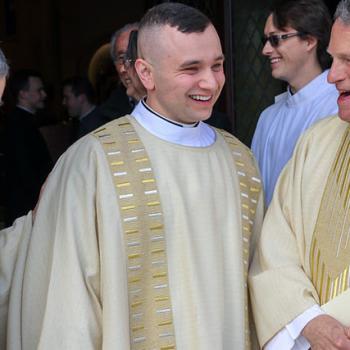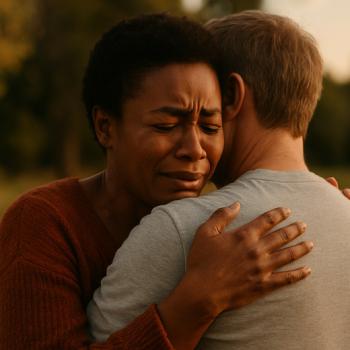Note: This article is part of a special Patheos Symposium, Passing on the Faith: Teaching the Next Generation. Read more perspectives here.
I love my kids. And one of my greatest joys in life is that they love our church community, pray regularly, sing hymns and spiritual songs, enjoy Bible stories, and recognize the centrality of loving others radically. We are Christians, so we have tried to help them see themselves as disciples of Jesus. God and the life of faith are regular parts of their conversations and (hopefully) hold sway over how they live. This is not unusual for smaller kids raised in an intentionally religious household; our oldest is six.
But I know that the day will come—not too far from now—when they may not like going to church or praying or worshiping or reading scripture or loving others. In fact, it is likely. And I worry about that, and how to handle it. On my best days, I worry because I believe that a life of discipleship is life, the way that we are created to be, and I want that for my kids more than anything. On my worst days, I think I worry because, in a bit of self-centered self-affirmation, I want my kids to be more like me.
Having children has been, among other things, a spotlight of chagrin for me, elucidating how narcissistically I can view the world. In my life, my friends have usually been very similar to me. I often read and listen to things that I already generally agree with (and if I don't already agree with it, I can be unreceptive, sadly). And I have largely belonged to institutions with only very safe versions of diversity. It is no wonder that I can tend to understand faith-life to look remarkably like my own.
But ever since becoming a parent, I have been more and more convicted of my tendency to unconsciously define discipleship according to the contours of my own life. My kids' lives are so different than mine. What brings me joy and worry is usually quite foreign to their day-to-day, and vice versa. Their encounter of sin and experience of grace is often different, too. So, also, the ways that they love their neighbor. And I gather, from our amazing conversations, that their internal conception of God is also different. But is that so bad? Has the Holy Spirit misled them into faulty theology by causing them to think differently than me? Or am I willing to be humble enough to admit that, in some ways, they assuredly understand God better than I do?
Every day, with my kids—and I know this will only increase as they grow into adolescence—I am intimately involved in the lives of people who are, in the words of Emmanuel Levinas, "the other." In light of the only-increasingly-prevalent generational segregation present in the West, a phenomenon that is blind to socio-economic status, when we interact with children and youth, we are embracing a diversity that is arguably greater even than other sorts. And this forces us --again, in moments of honesty, humility, and vulnerability—to see that we regularly regularize our understanding of discipleship. (Which, of course, is not discipleship at all. But that is a subject for another time.) When we interact with children and youth, it forces us to experience the Holy Spirit in foreign media, which are usually the most profound. Our kids have their own faith, their own connection to God, their own (often amazingly perspicacious) understandings of life, and, though God clearly has commissioned us parents to help guide our kids in their discipleship, God uses them to help us be better disciples, too.
We have much to teach our kids; we have the advantage of experience and facility for reflection. Of course, we get lots of things wrong, too—we should pray that the Holy Spirit would protect our kids from the harmful things that we will teach them. But, having said that, we ought to be intentional about passing on our faith to our kids in such a way that it will at once be the authentic faith of their community while also being their own. How can my wife and I pass our faith on to them while also allowing that they may follow Jesus in ways different and—hopefully!—better than we do? Let me suggest three questions, or sorts of questions, we can ask ourselves.
First, do we recognize the role of the community in passing on the faith? Usually, in raising their kids, parents tweak the teachings of their faith community to fit their own perspectives. This is inevitable. However, this can also undermine the fact that, despite our Modernistic individualism, while faith is certainly personal, it is also communal. In Christ, we are part of a larger Body, thanks be to God. The fact that we are surrounded by a great cloud of witnesses should help inoculate us against shortsightedness and parochialism. We should ask ourselves: Are we including other voices to inform our kids? Are we drawing other members of our community into our children's spiritual development? Are we allowing our sons and daughters to hear perspectives within our faith community that are different than our own?




